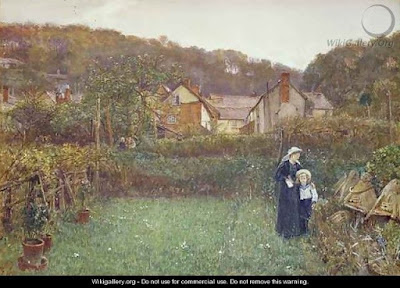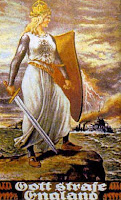 |
| Cyril Horne & Emmy Wehlen |
He found himself
in a very different drama in 1915, one of the few officers from his company who
survived the Battle of Loos unwounded.
Sometime after the battle, in late 1915, he wrote what is considered to
be one of the earliest poems describing the realities of the trench life: “The
Moles.” I’ve included an excerpt of the
poem; the full text can be found on pages 3-4 in Songs
of Shrapnel, and Other Verse by Cyril Morton Horne.
The Moles
I’ve been in a trench
for fifteen days,
It's harvest
time where my mother stays,
And I'm wishing
that I was there.
I've ceased to
count in the scheme of things.
My courage has
waned and set;
It's
trysting-time where the mavis sings
And I'm wishing
I could forget.
….
We've learnt the
law of shot and shell,
We've learnt the
law of steel;
But the Law of
the Trench is a cultured Hell
For it stifles
the power to feel.
….
We have used our
youth and lost the strength
That the spirit of
youth controls;
We have become
no more at length
Than partially
human moles.
….
And this is our
Fate: When the Gods are kind
Our existence
shall simply cease —
A sniper's
bullet — a trench that's mined —
God-speed, and a
quick release!
What is striking
about the poem is the matter-of-fact way in which it describes how the war has
transformed men into animals. The
guiding laws of morality and faith have been replaced with “the law of shot and
shell…the law of steel,” and months of living half-underground have blunted the
soldiers’ ability to feel. The young men
in the trenches are no more than “partially human moles.” They have seen repeated attempts to break free
in charges over the top, but these have resulted only in thousands of dead
and wounded, some bodies never recovered, some trapped between the lines, many
hastily buried in make-shift cemeteries.
The sum of these experiences brings the poignant realization, “I’ve ceased to count in the
scheme of things.” Men have lost not only their humanity, but their individual
identities in the mass slaughter.
Cyril Morton
Horne was killed on 27 January, 1916 when he and a fellow officer ignored “The
Law of the Trench” and attempted to rescue a wounded comrade lying in No Man’s
Land. The preface to his posthumously
published book of poems states, “A shrapnel shell exploded overhead just as his
comrades were ready to cheer him for his heroic rescue. Both men were killed
instantly.”
Three years
earlier, Horne had sung in the finale of Mlle
Modiste, “Alas to part, how great the sorrow, to leave the friends grown
fond with years, to know perchance that on the morrow, for love and smiles
come doubts and tears.” His wife Marie
chose as the epitaph for his grave the first two lines from one of his poems --
“Aftermath”:
A grim gray
tribute of memory
Is all that we
have left to give.
To those who
have fought and fallen
From those who
sorrow and live.
Memory lives;
and we wonder
If the law of
the Gods was kind,
For the hardest
battle was fought by
The Somebody-left-behind.










